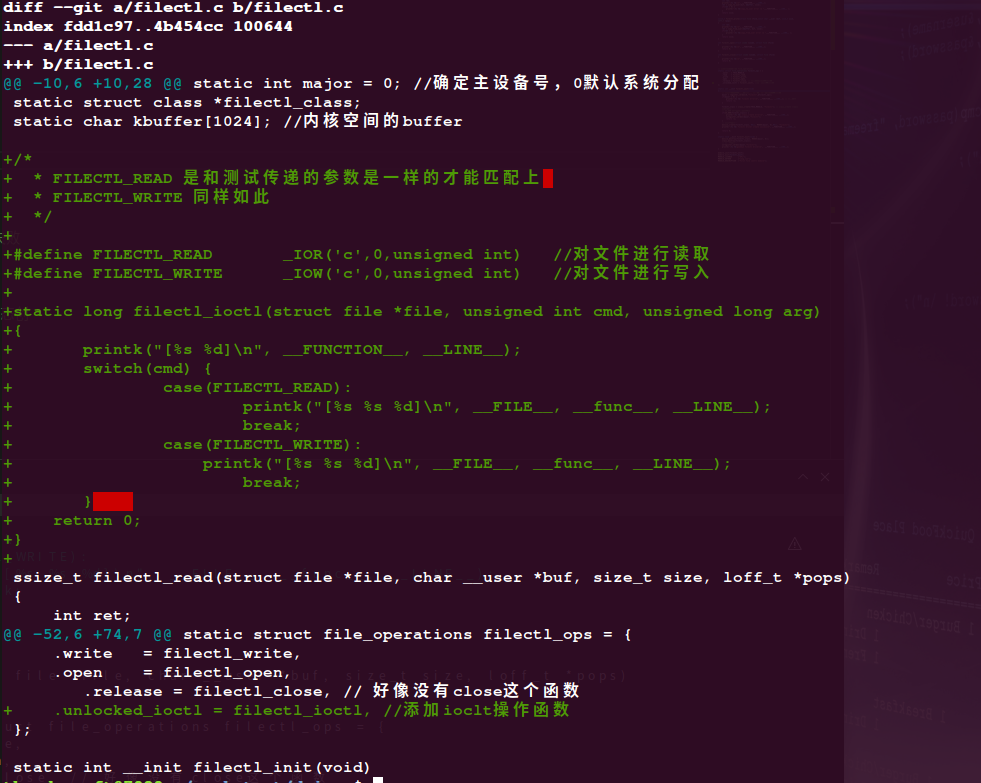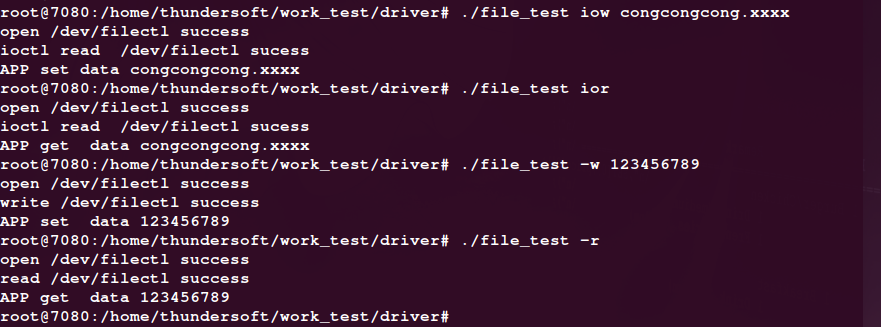linux驱动学习加强版-5(ioctl的使用)

文章目录
- 一、添加ioctl控制节点
- 二、修改测试APP
-
- 2.1 测试APP的代码:
- 2.2 驱动代码:
ioctl是用户空间和内核空间相互交流时候用的比较多的一种手段。
我们也可以在HAL层通过ioctl调到驱动里面。
一、添加ioctl控制节点
先看patch 吧

这是在驱动中添加的ioctl函数,同样的在ioctl里面去添加操作函数集合
二、修改测试APP
直接上源码:
#include <stdio.h>
#include <sys/types.h>
#include <sys/stat.h>
#include <sys/ioctl.h>
#include <fcntl.h>
#include <string.h>
#include <unistd.h>// 我们目前只传递一个参数
static int file_ioctl(unsigned int cmd) {return 1;
}#define FILECTL_READ _IOR('c',0,unsigned int) //对文件进行读取的命令
#define FILECTL_WRITE _IOW('c',0,unsigned int) //对文件进行写入的命令int main(int argc,char **argv)
{ if(argc <2){printf("Usage:%s -w <string>\\n",argv[0]);printf("Usage:%s -r \\n",argv[0]);return -1;}int fd;char buf[1024];fd = open("/dev/filectl",O_RDWR);if(fd < 0){printf("can not open /dev/filectl\\n");return -1;}printf("open /dev/filectl success \\n");// 屏蔽掉原来的参数// if(strcmp(argv[1],"-w")==0 && argc==3)// {// int err = write(fd, argv[2], strlen(argv[2]));// if (err < 0 ) {// printf("write /dev/filectl error \\n");// return -1;// }// printf("write /dev/filectl success \\n");// }else// {// int err = read(fd,buf,1024);// if (err < 0 ) {// printf("read /dev/filectl error \\n");// return -1;// }// printf("read /dev/filectl success \\n");// buf[1023] = '\\n';//}// 添加ioctl的函数if (strcmp(argv[1] , "ior") == 0 ) { //通过参数比较来获取命令int rc = ioctl(fd, FILECTL_READ); // 通过ioctl 函数去传递参数if ( rc < 0 ) {printf("ioctl read /dev/filectl error \\n");return -1;}printf("ioctl read /dev/filectl sucess \\n");} else if ( strcmp(argv[1], "iow") == 0 ) {int rc = ioctl(fd, FILECTL_WRITE, argv[2]);if ( rc < 0 ) {printf("ioctl read /dev/filectl error \\n");return -1;}printf("ioctl read /dev/filectl sucess \\n");} else {printf("please input right argv[1], 'ior' or 'iow'");printf("It will return error\\n");return -1;}printf("APP get data %s\\n",buf);close(fd);return 0;
}
然后我们加载模块,运行测试app


同样的我们还是会存在问题,就是读写的接口这些是有问题的,和之前的逻辑一样,下一步就是完善这个代码逻辑。
目前我们的框架已经是ok的了
话不多说 直接上代码:
2.1 测试APP的代码:
#include <stdio.h>
#include <sys/types.h>
#include <sys/stat.h>
#include <sys/ioctl.h>
#include <fcntl.h>
#include <string.h>
#include <unistd.h>#define FILECTL_READ _IOR('c', 0, unsigned int) //对文件进行读取
#define FILECTL_WRITE _IOW('c', 0, unsigned int) //对文件进行写入int main(int argc,char **argv)
{ int temp = 0;char buffer[1024]; // 存放内核拷贝的数据if(argc <2){printf("Usage:%s -w <string>\\n",argv[0]);printf("Usage:%s -r \\n",argv[0]);return -1;}int fd;char buf[1024];fd = open("/dev/filectl",O_RDWR);if(fd < 0){printf("can not open /dev/filectl\\n");return -1;}printf("open /dev/filectl success \\n");if(strcmp(argv[1],"-w")==0 && argc==3){int err = write(fd, argv[2], strlen(argv[2]));if (err < 0 ) {printf("write /dev/filectl error \\n");return -1;}printf("write /dev/filectl success \\n");printf("APP set data %s\\n",argv[2]);}else if (strcmp(argv[1],"-r")==0) {int err = read(fd,buf,1024);if (err < 0 ) {printf("read /dev/filectl error \\n");return -1;}printf("read /dev/filectl success \\n");printf("APP get data %s\\n", buf);buf[1023] = '\\n';} else if (strcmp(argv[1] , "ior") == 0 ) {int rc = ioctl(fd, FILECTL_READ, &buffer); // 将内核传递的数据读取出来if ( rc < 0 ) {printf("ioctl read /dev/filectl error \\n");return -1;}printf("ioctl read /dev/filectl sucess \\n");printf("APP get data %s\\n", buffer);buf[1023] = '\\n';} else if ( strcmp(argv[1], "iow") == 0 ) {int rc = ioctl(fd, FILECTL_WRITE, argv[2]); // 写入数据if ( rc < 0 ) {printf("ioctl write /dev/filectl error \\n");return -1;}printf("ioctl read /dev/filectl sucess \\n");printf("APP set data %s\\n",argv[2]);} else {printf("please input right argv[1], 'ior' or 'iow'");printf("It will return error\\n");return -1;}close(fd);return 0;
}
2.2 驱动代码:
#include <linux/module.h>
#include <linux/fs.h>
#include <linux/major.h>
#include <linux/init.h>
#include <linux/device.h>
#include <linux/stat.h>
#include <linux/tty.h>static int major = 0; //确定主设备号,0默认系统分配
static struct class *filectl_class;
unsigned char kbuffer[1024]; // 内核空间的buffer
unsigned char ubuffer[1024]; // 申请一段空间用于存放用户数据/ FILECTL_READ 是和测试传递的参数是一样的才能匹配上 * FILECTL_WRITE 同样如此*/#define FILECTL_READ _IOR('c', 0, unsigned int) //对文件进行读取
#define FILECTL_WRITE _IOW('c', 0, unsigned int) //对文件进行写入static long filectl_ioctl(struct file *file, unsigned int cmd, unsigned long arg)
{int ret;printk("[%s %d]1111\\n", __FUNCTION__, __LINE__);switch(cmd) {case FILECTL_READ:ret = copy_to_user((void __user *)arg, ubuffer, sizeof(ubuffer)); // 将内核空间的buffer拷贝至用户空间if(ret < 0) {printk("[%s %d]copy_to_user error\\n ",__FUNCTION__, __LINE__);}printk("[%s %s %d]\\n", __FILE__, __func__, __LINE__);break;case FILECTL_WRITE:ret = copy_from_user(ubuffer, (void __user *)arg, sizeof(ubuffer)); if(ret < 0) {printk("[%s %d]copy_from_user error \\n ",__FUNCTION__, __LINE__);}printk("[%s %s %d]\\n", __FILE__, __func__, __LINE__);break;}return 0;
}ssize_t filectl_read(struct file *file, char __user *buf, size_t size, loff_t *pops)
{int ret;printk("[%s %d]\\n", __FUNCTION__, __LINE__);ret = copy_to_user(buf, kbuffer, size);if(ret < 0) {printk("[%s %d]copy_to_user error \\n ",__FUNCTION__, __LINE__ );}printk("[%s %s %d]\\n", __FILE__, __func__, __LINE__);return size;
}ssize_t filectl_write(struct file *file,const char __user *buf, size_t size, loff_t *pops)
{int ret;printk("[%s %d]\\n", __FUNCTION__, __LINE__);ret = copy_from_user(kbuffer, buf, size);if(ret < 0) {printk("[%s %d]copy_from_user error \\n ",__FUNCTION__, __LINE__ );}return size;
}int filectl_open(struct inode *inode, struct file *file)
{printk("[%s %d]\\n", __FUNCTION__, __LINE__);return 0;
}int filectl_close(struct inode *inode, struct file *file)
{printk("[%s %d]\\n", __FUNCTION__, __LINE__);return 0;
}// 定义自己的驱动的 file_operations
static struct file_operations filectl_ops = {.owner = THIS_MODULE,.read = filectl_read,.write = filectl_write,.open = filectl_open,.release = filectl_close, // 好像没有close这个函数.unlocked_ioctl = filectl_ioctl, //添加ioclt操作函数
};static int __init filectl_init(void)
{// 在初始化的时候进行驱动注册, 设备号, 设备名,核心操作函数major = register_chrdev(0,"filectl",&filectl_ops); if(major < 0) {printk("[%s %d] filectl error\\n", __FUNCTION__, __LINE__); // 注册失败return -1;}filectl_class = class_create(THIS_MODULE, "filectl"); // class_create 动态创建dev的类// IS_ERR 查看指针是否有错误if(IS_ERR(filectl_class)) {printk("[%s %d] class_create error\\n", __FUNCTION__, __LINE__);unregister_chrdev(major,"filectl");return -1;}// 创建字符设备device_create(filectl_class, NULL, MKDEV(major, 0),NULL, "filectl");printk("[%s %d] filectl driver create success\\n", __FUNCTION__, __LINE__);return 0;
}static void __exit filectl_exit(void) {device_destroy(filectl_class, MKDEV(major, 0));class_destroy(filectl_class);// 注销字符设备unregister_chrdev(major,"filectl");printk("[%s %d]goodbye filectl driver\\n", __FUNCTION__, __LINE__);
}module_init(filectl_init);
module_exit(filectl_exit);
MODULE_LICENSE ("GPL");
MODULE_AUTHOR ("cong.luo");
MODULE_DESCRIPTION ("First file contrl module");测试结果:

内核使用两个buf,使用 ioctl 和 之前的读写接口互不影响。
